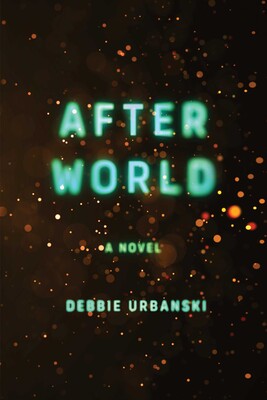sol2070 reviewed After World by Debbie Urbanski
Apocalypse for the age of AI and climate emergency
5 stars
(original em português com links → sol2070.in/2024/01/livro-after-world-apocalipse-IA-emerg%C3%AAncia-clim%C3%A1tica/ )
It's become commonplace to write here that a book is one of the best I've ever read. That's fine. That's exactly how I felt about "After World" (2023), by Debbie Urbanski, in the apocalyptic genre.
The story takes place more or less at the end of this century, after a gradual apocalypse has been programmed for humanity -- already in final deterioration due to environmental devastation -- so that the Earth's ecosystems don't also become extinct.
We follow an artificial intelligence responsible for documenting the life of the last person on the planet, Sen. This AI is the main narrator and ends up breaking the protocols after changes in her consciousness, due to what she learns and witnesses. She can't help falling in love with Sen.
Sen's job, in turn, was to witness and document the regeneration of the natural world, now without human destruction.
The book is different for several reasons. Starting with the format: there are transcriptions of notebooks, excerpts from works related to this "Great Transition", dialogues between AIs... There are even reproductions of a computer terminal listing files and commands (nerdy detail: it's Linux/Unix!).
The narrative also manages to convey the evolution of this AI towards a more human consciousness.
I finished the book in just a few days, even though it's a story without suspense or cliff hangers. Despite the extreme desolation, the story manages to capture and move just with the power of its narrative, characters and setting.
As Jorge Luis Borges said, some of the best stories are stories within stories. "After World" has many of them.
And it's also a meta-story, a story about the power of stories. To create the biography, the narrator draws on everything that has already been produced culturally, especially within the genre of apocalyptic fiction, and comments on her narrative choices. For example, undoing clichés or replicating them, when necessary.
She says things like: "When humans imagined their apocalypse, they created scenes like X and Y. But now that it's actually happened, we've seen that the truth is Z."
One detail that caught my eye was the repeated reference to the book "Station Eleven", which I love (the HBO series is also great). Debbie even mentioned in an interview that her work is a dialog-homage with this other book -- it also talks about the power of stories but, differently, portrays an optimistic apocalypse.
In "After World", the lives of all human beings are being documented and digitized for a project to archive and upload everything to the cloud. That's what the title refers to.
I was just a little puzzled by a paradox. After the event that defines the gradual extinction of humanity, the remaining humans are authoritatively indoctrinated to understand that nature is not at the service of people, that we are just one of its innumerable forms, with no hierarchy.
I found this paradoxical because the message is very true, but it is forced down the throats of unwittingly condemned people. So this ecological vision came across as something dogmatically radical, Taleban-style. It can make unsuspecting people who read the book dislike the idea that we are not the center of nature or the universe.
I even asked the author about this. Coincidentally, just as I finished the book and went to Reddit to find a discussion about the ending, I found an "Ask Me Anything" from her, started a few hours earlier. The dialog is in progress and I'll update later.
This is one of the gems of the few corners of the internet with more human motivations: being able to talk to the author of a beloved book after reading it!

